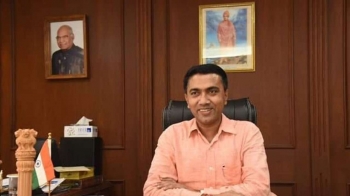
 Pachu Menon
Pachu Menon
.jpg)
Goa has apparently slipped in its ranking as the best governed state in the country in the small state category based on a composite index in the context of sustainable development.
However, with elections just round the corner, the government of the day will no doubt pull out all the stops to ensure that its people are left in no doubt whatsoever about its governing capabilities.
Accordingly, the haste to find solutions to unresolved issues that apparently eluded it for the past five years results in some of the most absurd of answers to the most tenacious of problems that it preferred sweeping under the carpet. Resumption of mining in the state, for instance!
Similar other issues where attempts essayed to address them have been more rhetoric rather than action-oriented conveys that aspect of all these problems which have underlying factors denying the ruling dispensation the luxury to resolve them at will.
Having the Chief Minister sounding so apologetic for the miserable conditions of the roads and highways and his efforts to mitigate the pathetic situation cannot but be seen as a knee-jerk reaction to the prevailing circumstances.
Instead of taking his Council of Ministers to task over the irregularities and inconsistencies, the quixotic approach that the Chief Minister is intent on pursuing will only send wrong signals to the public.
Ahead of the elections, holding his team together too is proving to be as Herculean a task for him as resolving long-pending issues of the citizens. In any case, the Chief Minister as the head of the government has his hands full right now.
But what sort of democratic norms are being subscribed to if it is only the last one year of a ruling dispensation’s term that assumes significance for the electorate in the face of the upcoming elections?
Pursuing its own agendas in the first few years of its inception, public relief measures and timely implementation of welfare schemes become secondary to its existence.
But without demanding accountability from its representatives, the masses are only allowing the government, no matter how popular it is, to decide its own course. Bad roads, poor services, inflation and unemployment, to name a few, are natural offshoots of this public complacency.
Rather than be satisfied with the tit-bits thrown at them now and then, it is pertinent to have a collective voice insisting on proper governance and sustainable development that could indeed turn this coastal state into a paradise in the true sense.
The ADR (Association of Democratic Reforms) report as a scathing indictment of the present state of affairs in Goa couldn’t have come at a worse time.
The critical report by the Association for Democratic Reforms and Goa Election Watch puts our legislators in the docks for the abysmal working of the Goa Legislative Assembly during its on-going seventh term.
With a decisive drop in the number of working days for its functioning to be effective, the poor performance of the house is indeed a matter of concern.
With average sittings of just sixteen days a year, over a four-year period, it is difficult to believe what the House has actually achieved?
Revelations that the total time spent by the legislators in the Assembly fell drastically over the four-year period is a true reflector of the lack of interest in governance that has been a striking feature of the current House.
As serious issues that need to have been debated by the elected representatives, the failure in ‘doing ease of business’, economic meltdown due to the pandemic and the bad conditions of the roads needed to have been prioritized.
The fiscal crisis experienced due to COVID-19 necessitated the opening up of fresh avenues of economic activities with the government formulating plans to facilitate the ease of doing business.
Call it a lack of political will or otherwise, the inconclusive search for a workable solution continues to hamper these initiatives.
The report by the election watchdog makes it more than obvious that most of these issues remained unaddressed solely because of the fewer number of hours spent by the legislators in the House.
However, it doesn’t require a detailed analysis of the performance of the Assembly by way of sittings, attendance of MLAs in sessions, questions asked by them and bills passed, to gauge the fact that governance has been taking a back seat in the state for quite some time now.
But for a government that has been more intent on consolidating its position in the House and has had to recurrently face the wrath of the people over decisions taken on various contentious issues affecting the lives of the locals, the absence of a formidable Opposition has been a blessing in disguise.
But this ‘arrangement’ where an overwhelming ruling party compelled the chief Opposition -- or what was left of it -- to perpetually remain occupied with survival strategies right through its term, cannot enable good governance.
Addressing the inaugural session of the 82nd All India Presiding Officers’ Conference in Shimla virtually from Delhi, Prime Minister Narendra Modi urged Parliamentarians and legislators to maintain quality and healthy debates in the Houses. With Parliament often witnessing disruptions over a variety of issues, the Prime Minister was of the opinion that the conduct of lawmakers should be in line with Indian values.
The need to have quality and healthy debates in the legislatures which should be serious, dignified and devoid of political pot-shots at others is being felt now as never before across the country.
The raucous scenes witnessed so often in the state Assembly these days doesn’t give any indication of things moving otherwise here and serves only to test the vocal strength of the Opposition legislators when they chance upon issues that could put the government of the day to shame over their ‘mishandling’.
As the essence of democracy, healthy debates in the House are a must for effective governance. At the same time, disallowing the Opposition the right to demand discussions on a particular matter does not behove a good government either.
But then politics in the state has been following a unique pattern and any immediate change of the present ‘arrangement’ appears to be a distant dream.